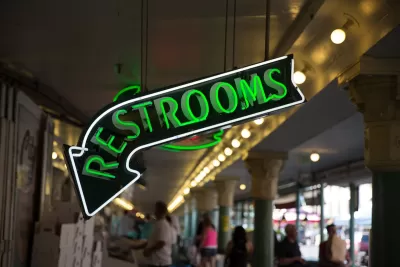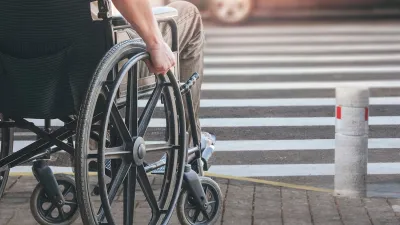For parents of young children, people with mobility equipment, and others, a lack of accessible public restrooms can mean limited outings.

In a piece republished in The Good Men Project, Emma Durand-Wood argues that a lack of public bathrooms is “not just an annoyance. It really affects people’s lives.”
According to Durand-Wood, “A 2019 report out of the U.K. included some grave findings. The study found that 20% of people don’t feel able to go out as much as they’d like to, specifically because of bathroom access. When my kids were young, I would have absolutely counted myself in that 20%. For those with medical conditions requiring frequent toilet use — like diabetes or bladder, bowel, or prostate conditions — this rose to 43%.”
The study also revealed that people restrict their liquids intake to limit how often they’ll need to use the bathroom, leading to dehydration that can exacerbate medical problems. Even when they are available, bathrooms are sometimes inaccessible to people with mobility issues or equipment.
Why have we decided that bathrooms are a must for special events and essential for tourists, yet our everyday selves aren’t worthy?
Durand-Wood concludes, “Even though the public benefits of bathrooms are so high for such a relatively low cost, we can readily grasp that this type of infrastructure will need ongoing, nonnegotiable maintenance, so we don’t even build them in the first place. It’s a bold contrast to million- or billion-dollar road expansions that provide very little return on investment and whose costs for maintenance and eventual replacement we give virtually no thought.”
FULL STORY: Dignity, Inclusivity and Walkability: How Public Bathrooms Help Cities Flourish

Planetizen Federal Action Tracker
A weekly monitor of how Trump’s orders and actions are impacting planners and planning in America.

Maui's Vacation Rental Debate Turns Ugly
Verbal attacks, misinformation campaigns and fistfights plague a high-stakes debate to convert thousands of vacation rentals into long-term housing.

Restaurant Patios Were a Pandemic Win — Why Were They so Hard to Keep?
Social distancing requirements and changes in travel patterns prompted cities to pilot new uses for street and sidewalk space. Then it got complicated.

Charlottesville Temporarily Has No Zoning Code
A judge ordered the Virginia city to throw out its newly revised zoning code, leaving permitting for new development in legal limbo.

In California Battle of Housing vs. Environment, Housing Just Won
A new state law significantly limits the power of CEQA, an environmental review law that served as a powerful tool for blocking new development.

Boulder Eliminates Parking Minimums Citywide
Officials estimate the cost of building a single underground parking space at up to $100,000.
Urban Design for Planners 1: Software Tools
This six-course series explores essential urban design concepts using open source software and equips planners with the tools they need to participate fully in the urban design process.
Planning for Universal Design
Learn the tools for implementing Universal Design in planning regulations.
Heyer Gruel & Associates PA
JM Goldson LLC
Custer County Colorado
City of Camden Redevelopment Agency
City of Astoria
Transportation Research & Education Center (TREC) at Portland State University
Jefferson Parish Government
Camden Redevelopment Agency
City of Claremont





























